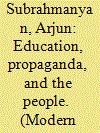|
|
|
Sort Order |
|
|
|
Items / Page
|
|
|
|
|
|
|
| Srl | Item |
| 1 |
ID:
140294


|
|
|
|
|
| Summary/Abstract |
On the morning of 24 June 1932 the ‘People's Party’, a small group of civil and military bureaucrats, toppled the Thai absolute monarchy and introduced constitutional democracy. This article discusses the establishment of democracy as an endeavour in ‘democratic paternalism,’ by which is meant the Party's attempt to establish a new moral and intellectual leadership that had as its main goal the creation of a depoliticized democratic citizenry. To implement their programme for democracy, the Party embarked on an ambitious plan to modernize education and explain popular sovereignty through countrywide lectures and radio programmes. The democratic paternalist effort had mixed results. State weakness limited the reach of the educational and propaganda campaigns, and further the ‘people’ in whose name the revolution was staged, constituted two different groups: a largely illiterate peasantry and a small, incipient new intelligentsia. Because of its limited capacity, the People's Party tasked the second group with assisting in democratic mentorship of the masses, but many in this second category of people had a broader conception of democracy than the Party's ‘top-down’ model and criticized the Party for its paternalist constraints on popular sovereignty. Democratic paternalism and frustration with the limits imposed on popular democracy are two central aspects of this period of history that have endured in Thai society.
|
|
|
|
|
|
|
|
|
|
|
|
|
|
|
|
| 2 |
ID:
142852


|
|
|
|
|
| Summary/Abstract |
This article examines representations of Thai society in fiction during the 1920s and 1930s. Initially the hobby of palace writers and readers, by the 1930s the evolving form had come to be widely popular with middle-class commoners. The rise of middle-class society was of profound importance in the interwar period: far beyond constituting a new reading and writing public, social and economic change undermined the political power of the old elite, and in 1932 a bureaucratic coup toppled the absolute monarchy. But the 'revolution', as it came to be known, was incomplete; the growth of new social classes and democratic ideas did not produce a new society. Nor, as this article demonstrates, did it destroy the cultural power of the old elite. The royal–aristocratic class remained cultural icons, and this is clearly shown in the new genre of realistic fiction that appeared. Royalist culture, an enduring aspect of twentieth century Thai history, maintained its power through a period of crisis largely because of its adaptation to changed circumstances.
|
|
|
|
|
|
|
|
|
|
|
|
|
|
|
|
| 3 |
ID:
167224


|
|
|
|
|
| Summary/Abstract |
Buddhist modernist movements transformed the religious practice and social engagement of one of the world's principal faiths in the nineteenth and twentieth centuries. These movements produced diverse effects on Asian societies which, despite generic similarities, are best understood in particular socio-historical contexts. This article examines the work of a group of young Thai monks and laymen who had an ambitious aim to morally improve and empower people; and the practical adaptation of this impulse in a society in transition from absolute monarchy to constitutional democracy in the 1930s. Like many modernist movements, their work was innovative. But it also was an inheritance of religious and political history, and the Thai modernist case thus shows a contradiction between novelty and custom that was resolved in a way that blunted the movement's reformist energy.
|
|
|
|
|
|
|
|
|
|
|
|
|
|
|
|
|
|
|
|
|